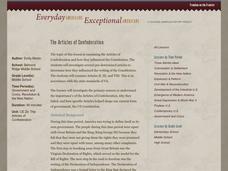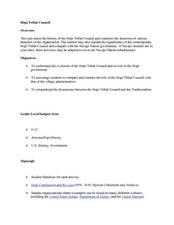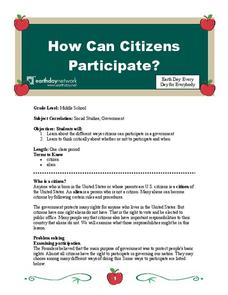US Institute of Peace
Governance, Corruption and Conflict Simulation on Nepal
Can your class help the people of Nepal? Scholars take an in-depth look into the social injustices and struggling economy of a country in turmoil during a multi-day role-playing exercise. After reviewing information on the problems...
Curated OER
Three Levels of Government
Students name and broadly classify the powers and duties of each level of executive government in Australia. They identify and examine areas of overlaid and cooperation between various executive levels. Students examine the nature of...
Roy Rosenzweig Center for History and New Media
The Articles of Confederation
Have you ever started a project only to realize you need to scrap it and start over? Scholars analyze the issues leading to the fall of the Articles of Confederation. A group investigation into Articles II, III, and VIII unveil the...
Curated OER
Family Forms and Family Life Cycle
There are so many different types of families, and each family functions in a different way. Discover the different roles, responsibilities, and relationships that develop in different family types. The lesson provides you with five...
Equality and Human Rights Commission
Discrimination
Discrimination takes many forms, and lesson eight in the 12-part series addresses many types and their greater impact on society. The lesson uses a presentation, videos, news stories, and discussions to synthesize many different viewpoints.
Curated OER
Hopi Tribal Council
Focusing on the differences between traditional Hopi government and the Hopi Tribal Council, this resource is a good addition to your unit on Native American culture. Learners conduct Internet research, analyze primary source photos, and...
Curated OER
Is Gulf War Syndrome a Significant Health Issue the U.S. Government has Tried to Cover Up?
High schoolers examine the issues surrounding Gulf War Syndrome. In groups, they analyze evidence from the war and medical information. They participate in a debate in which they support their feelings on whether the government of the...
Alabama Department of Archives and History
Marketing a Bad Idea: Why So Many People Joined the Klan in the 1920s
How did the Klu Klux Klan manage to gain so many members during the 1920s? Class members examine Klan documents and promotional materials to gain an understanding of the propaganda techniques used to attract members.
Curated OER
Diversity Government
Students explore diversity through government. In this diversity lesson, students use types of government as a way to understand the importance of diversity. Students use "diversity beans" to facilitate discussion with one another.
Humanities Texas
A President's Vision: George Washington
Who knew that one poster about George Washington could have so many learning possibilities attached to it? Here you'll find an attractive learning display on the first president of the United States, as well as worksheets and...
California Polytechnic State University
Australian Geography Unit
At the heart of this resource is a beautifully detailed PowerPoint presentation (provided in PDF form) on the overall physical geography of Australia, basic facts about the country, Aboriginal history, and Australia culture and lifestyle.
US Institute of Peace
Organizations Working for Peace
From helping refugees to negotiating peace treaties, the peacekeepers of the world keep busy! Introduce young activists to the many individuals and organizations throughout the world that work daily toward peace. 14th in a series of 15...
Curated OER
Representation: Majority Rule
Young scholars explore government. In this decision making lesson plan, students discover the importance of majority rule in the passing of bills. They all participate in a class debate and practice the different forms of decision...
US Institute of Peace
Organizations Working for Peace
We're all in this together! Show young scholars that peace is a process and having the support of like-minded people can make it happen. 13th in a series of 15 peace building activities, groups conduct research on a peace organization,...
Curated OER
The Movement Before the Movement: Civil Rights Activism in the 1940s
Many educators focus on the civil rights movement as it occurred after Rosa Parks incited the bus boycott. Extend the understanding of the fight for civil rights in the United States with this post-WWII lesson. Learners examine and...
Constitutional Rights Foundation
Puritan Massachusetts: Theocracy or Democracy?
Was Puritan society governed as more of a theocracy or democracy? After comparing and contrasting a series of primary source documents, middle and high schoolers form small groups and debate the question.
Curated OER
Lesson 6: Crowded Skies
This is a treasure-trove of multimedia resources to help your scholars analyze transportation methods. They discuss different forms of movement, utilizing several infographics to spur conversation deeper and get visual learners engaged....
Japan Society
Changing Times, Changing Styles: New Japanese Literary Styles of the Late Nineteenth Century
Focusing on Doppo's "Unforgettable People" and late nineteenth century Japanese literature, this resource also leads to discussions of form being dictated by content. Explore the development of new literary styles first-hand by...
Lesson Snips
Lessons from the Holocaust
Connect global examples of attempted genocide with a well-designed social studies lesson. It includes an excellent informational text with background information on the Holocaust, as well as worksheets, book report guidelines, and...
Council for Economic Education
Tax Time Scavenger Hunt
Is a 1040EZ tax form really easy? Scholars investigate the complexities of the United States taxation system with an economics lesson. Using a wide variety of web sources, they interpret IRS taxation rules and regulations to better...
James Madison Memorial Fellowship Foundation
A Deliberate, Palpable and Dangerous Exercise of Other Powers: James Madison & Homeland Security
This resource uses primary source documents to explore the First Amendment. After reviewing key events of the 1790s, government or US history classes explore Madison's letter to Jefferson regarding the Alien and Sedition Acts. They then...
Curated OER
Protesting within First Amendment Rights
Students research the First Amendment and what it says about the right to peaceably assemble as well as read in particular about those who were arrested or removed from an area for being disruptive during a protest on the War in Iraq....
Curated OER
Political Issues and Opinions
The emergent adults in your US Government class can become informed, self-aware voters. This activity enables them to form an opinion about particular political issues then identify themselves on the political spectrum. Informed and...
Curated OER
How Can Citizens Participate?
Students discuss the role of citizens in society and in government. Working in groups, students list ways in which individuals can participate in government as well as the advantages and disadvantage of that participation. Each group...

























